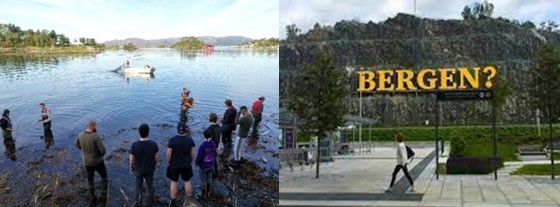
Left image: BIO102 students at the marine biological station at work setting a beach seine autumn 2022. Right image: Artwork for inspiration and reflection at Bergen airport. Where do we go?
On approach to Bergen Airport, one can observe a particularly beautiful coastal and fjord landscape, with the university’s marine biological station (MBS) close by.
At the risk of taking this natural splendor and the location of the station for granted, it may be timely to see it in the context of the artwork “BERGEN?”. At a time when we have to make demanding and difficult choices due to poor finances at BIO and UiB, I propose a new slogan for inspiration for our further strategic choices, “WHY BERGEN?”. For what should BIO and UiB focus on in the future? What are our inherent and comparative advantages? Easy access to a unique coastal and fjord environment with associated biological resources attracts large international research groups and research networks that want to collaborate. For many international academic communities, an associated scientific community in Bergen is a natural first choice for cooperation within the marine academic field.
At the same time, society expects all higher education institutions to deliver relevant and good research and education. Competition in the university sector is fierce, both for the best minds and the funds needed to be able to do an excellent job. The educational institutions cannot cover all academic fields equally well. Then you have to make wise strategic choices. What is it then that indicates that a given field should be focused on here at BIO and UiB? UiB has a long tradition and a history of good results within marine research and education. It is also one of the few universities that has dedicated higher education in fisheries biology and management. There is a great need for the education of qualified candidates who will work with opportunities and challenges on the coast and in the sea linked to e.g. climate effects, biological diversity, aquaculture and responsible management and harvesting of marine resources. If BIO and UiB do not take this social mission as given, then who will? Unfortunately, we are in a situation where BIO cannot replace valuable expertise that disappears through retirements and departures. This saving occurs randomly, and is not anchored in a strategically sustainable process. The marine scientific environment is hit particularly hard. We are in danger of losing important expertise in fields where BIO and UiB should be first in line to take national and international responsibility. We must not forget where we are, who we work for, and what opportunities we have right outside the shoreline. Nor can we sit back and believe that marine academic collaboration opportunities will flourish in the absence of own staff. In the further strategic work, I therefore encourage everyone to reflect on “WHY BERGEN?”.
Mvh,
Arild Folkvord
Faggruppeleder for Fiskeribiologi og forvaltning og Marinbiologi

